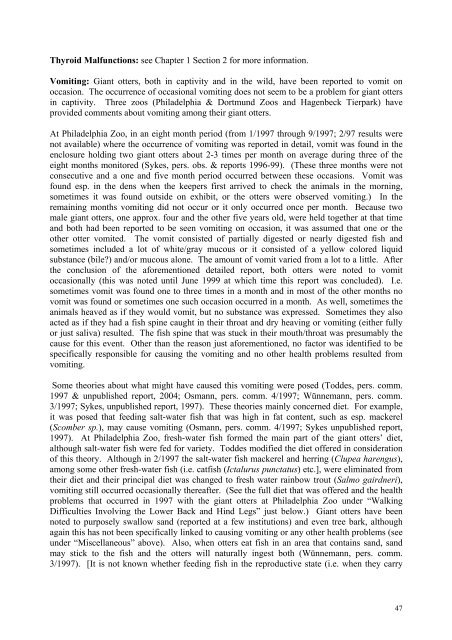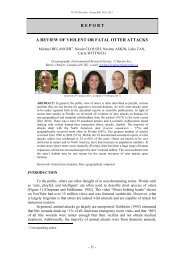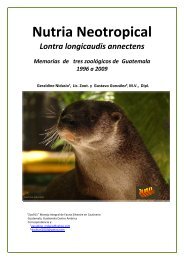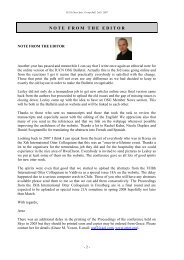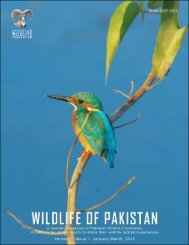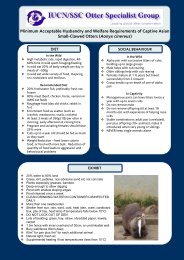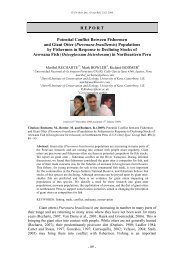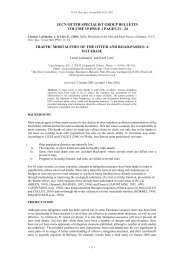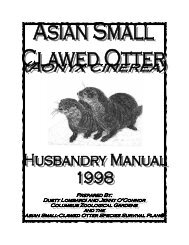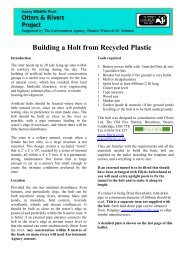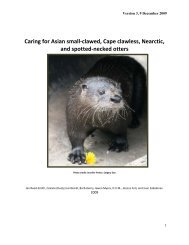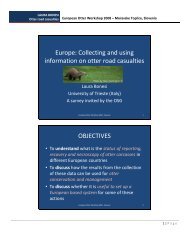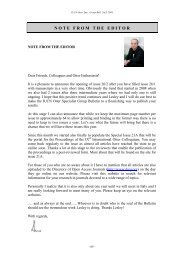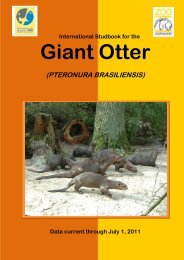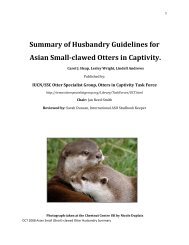International Giant Otter Studbook Husbandry and Management
International Giant Otter Studbook Husbandry and Management
International Giant Otter Studbook Husbandry and Management
Create successful ePaper yourself
Turn your PDF publications into a flip-book with our unique Google optimized e-Paper software.
Thyroid Malfunctions: see Chapter 1 Section 2 for more information.<br />
Vomiting: <strong>Giant</strong> otters, both in captivity <strong>and</strong> in the wild, have been reported to vomit on<br />
occasion. The occurrence of occasional vomiting does not seem to be a problem for giant otters<br />
in captivity. Three zoos (Philadelphia & Dortmund Zoos <strong>and</strong> Hagenbeck Tierpark) have<br />
provided comments about vomiting among their giant otters.<br />
At Philadelphia Zoo, in an eight month period (from 1/1997 through 9/1997; 2/97 results were<br />
not available) where the occurrence of vomiting was reported in detail, vomit was found in the<br />
enclosure holding two giant otters about 2-3 times per month on average during three of the<br />
eight months monitored (Sykes, pers. obs. & reports 1996-99). (These three months were not<br />
consecutive <strong>and</strong> a one <strong>and</strong> five month period occurred between these occasions. Vomit was<br />
found esp. in the dens when the keepers first arrived to check the animals in the morning,<br />
sometimes it was found outside on exhibit, or the otters were observed vomiting.) In the<br />
remaining months vomiting did not occur or it only occurred once per month. Because two<br />
male giant otters, one approx. four <strong>and</strong> the other five years old, were held together at that time<br />
<strong>and</strong> both had been reported to be seen vomiting on occasion, it was assumed that one or the<br />
other otter vomited. The vomit consisted of partially digested or nearly digested fish <strong>and</strong><br />
sometimes included a lot of white/gray mucous or it consisted of a yellow colored liquid<br />
substance (bile?) <strong>and</strong>/or mucous alone. The amount of vomit varied from a lot to a little. After<br />
the conclusion of the aforementioned detailed report, both otters were noted to vomit<br />
occasionally (this was noted until June 1999 at which time this report was concluded). I.e.<br />
sometimes vomit was found one to three times in a month <strong>and</strong> in most of the other months no<br />
vomit was found or sometimes one such occasion occurred in a month. As well, sometimes the<br />
animals heaved as if they would vomit, but no substance was expressed. Sometimes they also<br />
acted as if they had a fish spine caught in their throat <strong>and</strong> dry heaving or vomiting (either fully<br />
or just saliva) resulted. The fish spine that was stuck in their mouth/throat was presumably the<br />
cause for this event. Other than the reason just aforementioned, no factor was identified to be<br />
specifically responsible for causing the vomiting <strong>and</strong> no other health problems resulted from<br />
vomiting.<br />
Some theories about what might have caused this vomiting were posed (Toddes, pers. comm.<br />
1997 & unpublished report, 2004; Osmann, pers. comm. 4/1997; Wünnemann, pers. comm.<br />
3/1997; Sykes, unpublished report, 1997). These theories mainly concerned diet. For example,<br />
it was posed that feeding salt-water fish that was high in fat content, such as esp. mackerel<br />
(Scomber sp.), may cause vomiting (Osmann, pers. comm. 4/1997; Sykes unpublished report,<br />
1997). At Philadelphia Zoo, fresh-water fish formed the main part of the giant otters’ diet,<br />
although salt-water fish were fed for variety. Toddes modified the diet offered in consideration<br />
of this theory. Although in 2/1997 the salt-water fish mackerel <strong>and</strong> herring (Clupea harengus),<br />
among some other fresh-water fish (i.e. catfish (Ictalurus punctatus) etc.], were eliminated from<br />
their diet <strong>and</strong> their principal diet was changed to fresh water rainbow trout (Salmo gairdneri),<br />
vomiting still occurred occasionally thereafter. (See the full diet that was offered <strong>and</strong> the health<br />
problems that occurred in 1997 with the giant otters at Philadelphia Zoo under “Walking<br />
Difficulties Involving the Lower Back <strong>and</strong> Hind Legs” just below.) <strong>Giant</strong> otters have been<br />
noted to purposely swallow s<strong>and</strong> (reported at a few institutions) <strong>and</strong> even tree bark, although<br />
again this has not been specifically linked to causing vomiting or any other health problems (see<br />
under “Miscellaneous” above). Also, when otters eat fish in an area that contains s<strong>and</strong>, s<strong>and</strong><br />
may stick to the fish <strong>and</strong> the otters will naturally ingest both (Wünnemann, pers. comm.<br />
3/1997). [It is not known whether feeding fish in the reproductive state (i.e. when they carry<br />
47


